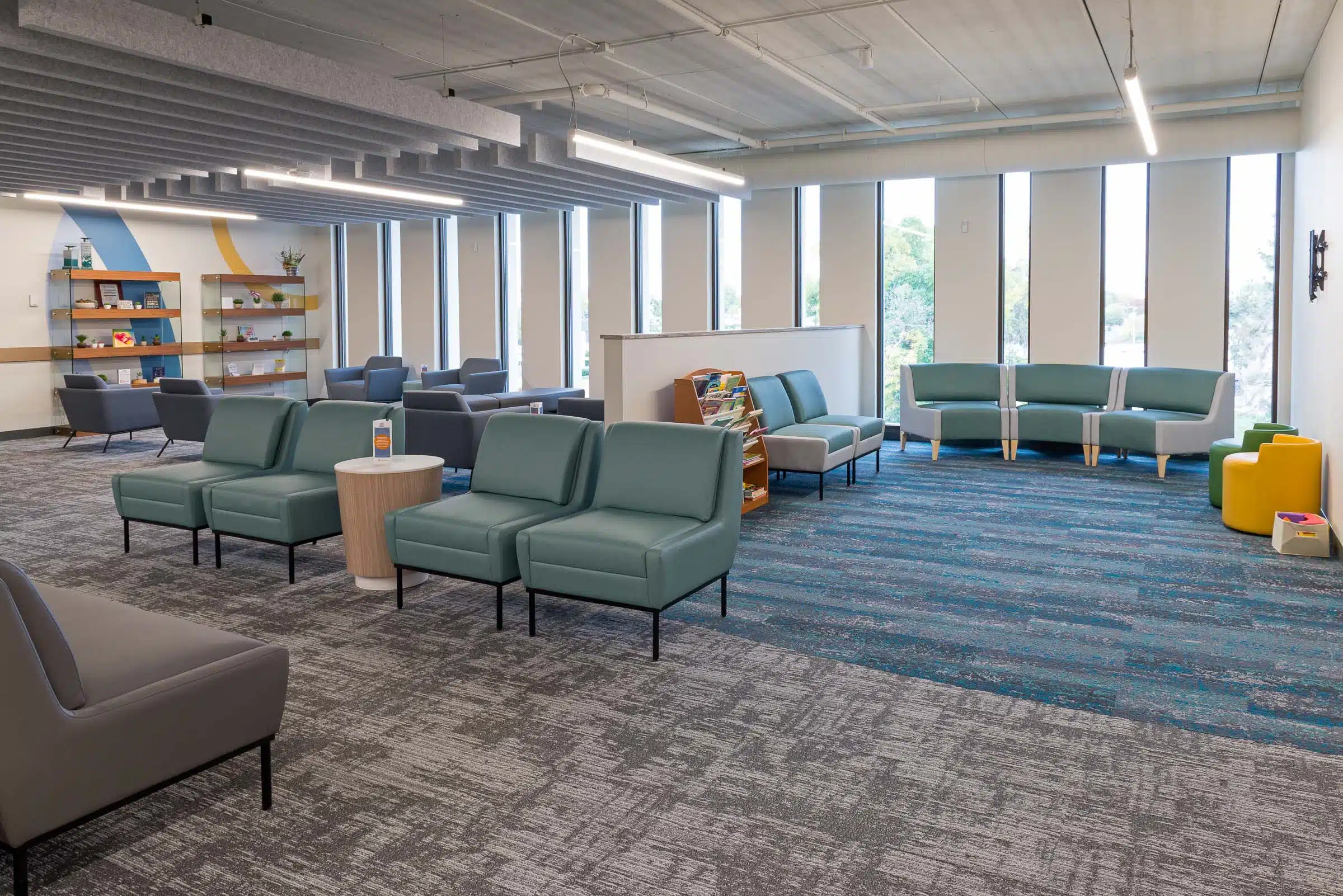The best way to help someone with neurodevelopmental disorders is to educate yourself and them about the disorder and to support them in getting proper treatment. Proper treatment includes effective management strategies for symptoms, medication, and therapies.

Neurodevelopmental Disorder Treatment Center in the Twin Cities, MN
What Is a Neurodevelopmental Disorder?
A neurodevelopmental disorder is a condition that impacts brain development and functioning. These disorders usually begin in childhood or early adolescence and continue throughout adulthood.
Severity of symptoms within neurodevelopmental disorder vary widely depending on the individual and their unique development. Additionally, secondary mental health conditions can arise from living with a neurodevelopmental disorder. These include anxiety, depression, mood disorders, behavioral problems, eating disorders, substance abuse, and more.
Neurodevelopmental disorders and their associated mental health conditions often have a significant influence on a person’s daily life. People with neurodevelopmental disorders often experience unique struggles, challenges, and strengths. They may experience difficulty with cognition, behavior, nervous system regulation, motor skills, and/or social interactions.
Comprehensive neurodevelopmental disorder treatment at PrairieCare centers throughout Minnesota address the impacts and mental health conditions that arise from having a neurodivergent brain and nervous system. Our programs help individuals and their families better understand and navigate struggles and strengths, heal underlying mental health issues, and find the support and tools they need to live a more fulfilling and sustainable life.
Types of Neurodevelopmental Disorders
Neurodevelopmental disorders include:
- Attention-deficit/hyperactivity disorder (ADHD)
- Autism spectrum disorder (ASD)
- Intellectual developmental disorders
- Communication disorders
- Specific learning disorders
- Motor disorders
- Tic disorders
Combined, these conditions impact 10% of all children, and many of these disorders persist throughout adulthood. Let’s take a closer look at the various types of neurodevelopmental disorders.
ADHD
Attention-deficit/hyperactivity disorder (ADHD) is characterized by differences in the brain’s executive functions, resulting in inattention, hyperactivity, and/or impulsivity. ADHD may present as:
- Predominantly inattentive
- Predominantly hyperactive-impulsive
- Combined (symptoms of both inattentive and hyperactive-impulsive)
Classic symptoms include distractibility, restlessness, interrupting others, trouble focusing, forgetfulness, and difficulty with emotion regulation. These symptoms negatively interfere with school and/or work, home, and social connections. Many people with ADHD also experience associated mental health issues, such as anxiety or depression.
Autism Spectrum Disorder (ASD)
People on the autism spectrum experience challenges with behavioral issues, bodily motor issues, and social interactions. Symptoms include difficulty with nonverbal communication, difficulty understanding or expressing emotions, repetitive motor movements, difficulty with emotion regulation, and rigid adherence to routine.
People with ASD also tend to have highly specialized interests about which they are extremely knowledgeable and passionate. Common secondary mental health conditions include social anxiety and generalized anxiety.
Intellectual Developmental Disorders
Intellectual developmental disorders are characterized by difficulties in intellectual and adaptive functioning. Symptoms include challenges with reasoning, problem-solving, judgment, academic learning, and learning life skills. People with intellectual developmental disorders may experience secondary mental health conditions, including depression, anxiety, ADHD, and schizophrenia.
Communication Disorders
Communication disorders involve persistent challenges with language and speech. There are five categories of communication disorders recognized by the DSM-V:
- Language disorder
- Speech sound disorder
- Childhood-onset fluency disorder (stuttering)
- Social communication disorder
- Unspecified communication disorder
Communication disorders can increase feelings of loneliness, isolation, anxiety, and depression.
Specific Learning Disorders
Specific learning disorders refer to academic difficulties in reading, writing, or math. Different types include:
- Dyslexia: difficulty processing written words
- Dysgraphia: difficulty with spelling, grammar, punctuation, or handwriting
- Dyscalculia: difficulty with number-related concepts in math
Many people with specific learning disorders also experience ADHD and anxiety.
Motor Disorders
Motor disorders are characterized by issues with body movement and coordination. These include:
- Developmental coordination disorder, which hinders everyday tasks such as running or riding a bike
- Stereotypical movement disorder, which includes fixed and repetitive movements such as arm flapping or rocking side to side
Tic Disorders
Tic disorders are comprised of a variety of disorders that involve motor or vocal tics. Tics are involuntary and repetitive movements or sounds. Tic disorders include:
- Tourette Disorder
- Persistent (Chronic) Motor or Vocal Tic Disorder
- Provisional Tic Disorder
- Other Specified Tic Disorder
- Unspecified Tic Disorder
Tic disorders often improve with age, but the severity and longevity of symptoms depend on the individual. These disorders, particularly Tourette Disorder, are often accompanied by other mental health conditions, like obsessive-compulsive disorder (OCD) and ADHD.
Causes of Neurodevelopmental Disorders
Neurodevelopmental disorders are caused by structural differences in the brain. These structural differences may be caused by genetics, environment, or a combination of both. One known factor in ADHD, for example, is the deficiency of the neurotransmitter dopamine in the brain. This can lead to altered behaviors and mental states, such as depression, lack of self-control, and excessive impulsiveness.
Most neurodevelopmental disorders develop in childhood or early adolescence, and continue throughout adulthood. Some decrease in intensity or symptomology with age. Many of the symptoms, as well as the secondary mental health concerns associated with the disorder, can be reduced through proper treatment and management strategies.
Symptoms of Neurodevelopmental Disorders
Symptoms of neurodevelopmental disorders vary by type, severity, and the individual experiencing the disorder. In general, symptoms of neurodevelopmental disorders tend to include challenges in some or all of the following areas:
- Motor skills
- Language and speech
- Behavior
- Memory
- Learning ability
- Hypersensitivity (to certain sensory stimulation, for example)
- Social skills
- Sensorimotor functions
- Secondary mental health conditions, such as anxiety and depression

Neurodevelopmental Disorders Treatment
At PrairieCare, we use a comprehensive treatment approach to treat neurodevelopmental disorders and secondary mental health conditions. All of our patients are assessed individually and treated based on level of care needed, cognitive status, and developmental needs.
ADHD Treatment
At PrairieCare, we treat ADHD as a primary condition. We often utilize a combined medication and psychotherapy intervention approach. The modality of psychotherapy for ADHD as a primary presenting issue varies by provider, and includes evidence-based practices such as Cognitive Behavioral Therapy (CBT) for the patient, family-based behavioral therapy, and parent coaching.
Additionally, we treat secondary mental health conditions that develop as a result of or alongside ADHD and other neurodevelopmental disorders. These conditions may include anxiety, depression, emotion regulation issues, behavioral management (such as impulse control), and more.
Treatment for Other Neurodevelopmental Disorders
For neurodevelopmental disorders other than ADHD, PrairieCare treats associated secondary mental health conditions that may develop as a result of or alongside the primary disorder(s). These secondary conditions include the following:
- Anxiety
- Depression
- Emotion regulation
- Problems with socializing or communicating
- Behavioral issues, such as angry outbursts or hitting
Our treatment programs are most effective for those who are deemed cognitively and developmentally able to safely function in group settings with same-aged peers.
PrairieCare’s Treatment for Neurodevelopmental Disorders in the Twin Cities and Throughout Minnesota
The appropriate neurodevelopmental disorder treatment plan depends on the type of disorder, the severity of the symptoms, and the impact of symptoms and secondary mental health conditions on your life. When you fill out an assessment and intake for treatment with PrairieCare, our team will help you or your loved one determine your options and next steps.
No matter what type of treatment plan you need, we work with you to determine the best approach for your treatment. Our team has a patient-centered philosophy, and we use trauma-informed models of care to foster safety and healing.
PrairieCare’s comprehensive programs are tailored to address the unique circumstances, needs, strengths, and challenges of each person. Our treatment teams, made up of medical doctors, psychiatrists, clinicians, nurses, dietitians, and counselors, work together to individualize care and establish positive behavioral supports with patients and their families.
PrairieCare offers a variety of services and programs at nine different locations throughout Minnesota. These include the following treatment options:
- Neuropsychological and psychological testing to determine best care
- Psychiatry and medication management by a dedicated team of health professionals
- Psychotherapy with our experienced clinicians, including Cognitive Behavioral Therapy (CBT) and Dialectical Behavioral Therapy (DBT)
- Group therapy, in which participants learn coping strategies for their symptoms and receive ongoing support and healing in a community environment
- Marriage and family therapy
- A variety of specialty therapies facilitated by experts, including Play Therapy, Art Therapy, and integrative health programs
We Accept Insurance
PrairieCare is an in-network provider for most major insurance plans, allowing us to continually expand access to mental health treatment in Minnesota.
Our Levels of Care for Neurodevelopmental Disorder Treatment
At PrairieCare, we provide intensive care, such as inpatient hospitalization and residential treatment, as well as various outpatient programs, to fit the needs of each patient. Our team shapes a neurodevelopmental disorder treatment plan to fit the unique needs of each patient and determines the right level of care for the best outcome.
Clinic and Outpatient Services: Offering in-person and telehealth settings, our clinic and outpatient treatment provides specialized psychotherapy, medication management, and evaluation. We offer specialty approaches including Play Therapy, Marriage and Family Therapy, Air Water Earth (AWE) Therapy, and more.
Intensive Outpatient Program (IOP): IOP is a level of care that provides programming four days a week, several hours a day, for individuals struggling with symptoms of mental illness that are interfering with their daily living and are not manageable through weekly therapy and/or medication management alone. We offer IOPs for youth (ages 11–17) and young adults, as well as Adapted Dialectical Behavioral Therapy (A-DBT) track.
Partial Hospitalization Program (PHP): Our PHP programs take place five days a week, with a full day of programming. This level of care is helpful for adults and youth who are struggling with symptoms of neurodevelopmental disorders or other mental health conditions that are interfering with their daily tasks, such as school, caring for themselves, and going to work.
Inpatient Treatment: Our inpatient program provides 24/7 safety and stabilization for teens and young adults following severe symptoms or mental health episodes. This type of treatment offers group, individual, and family therapy sessions in a hospital setting. Inpatient care focuses on stabilizing acute symptoms for patients who may have a higher risk of dangerous behavior, including suicidal behavior or self-harm.
Residential Treatment Program: With an average stay of three months, residential treatment offers those with severe neurodevelopmental disorders and co-occurring disorders the care they need. Informed by psychodynamic theory and guided by therapeutic skills, PrairieCare’s residential treatment focuses on helping youth, young adults, and families build lives that are sustainable, enriching, and meaningful.

Our Convenient Minnesota Locations
PrairieCare’s MN neurodevelopmental treatment locations have a soothing atmosphere and compassionate team members. Our facilities are equipped with gyms, recreational therapy rooms, sensory rooms, and more, to allow patients to focus on safety and healing.
With our full continuum of behavioral health treatment, children, adolescents, and young adults can receive the highest quality care for neurodevelopmental disorder treatment in Minnesota.
Our Locations Providing Neurodevelopmental Disorder Treatment in Minneapolis and St. Paul:
- Brooklyn Park, Medical Office Building
- Brooklyn Park Inpatient Hospital
- Chaska
- Edina
- Maple Grove
- Maplewood
- Minneapolis, Center for Families
- Woodbury
Our Treatment Centers for Neurodevelopmental Disorders in Southern Minnesota:
We Can Help
Finding the right treatment for neurodevelopmental disorders in Minnesota can be daunting. At PrairieCare, our team guides you through the process and finds the appropriate care setting, so you and your family can focus on healing.
Are you ready to start treatment for neurodevelopmental disorders for yourself or your child? Call our Assessment and Intake Department at 952-826-8475.
Get Started on the Healing Journey
Learn more about how we support patients and families in their mental health journey.
Access a No-Cost Mental Health Screening
Our Assessment and Intake Department offers no-cost mental health screenings to determine the best type of treatment for you or your loved one.
FAQs
The most effective treatment for neurodevelopmental disorders is a comprehensive plan that takes into account the type of disorder, severity of symptoms, and individual needs and challenges. Many treatments focus on a combination of medication and different modalities of therapeutic treatment, including CBT, play therapy, and family therapy.
The treatment plans for neurodevelopmental disorders at PrairieCare include primary treatment for ADHD, and treatment of secondary mental health conditions for all other neurodevelopmental disorders. Treatment plans focus on a combination of medications and therapies that fit each individual’s needs.
The goal of neurodevelopmental treatment is to reduce the severity of symptoms and to introduce strategies for symptom management. Treatment also addresses the underlying mental health conditions associated with neurodevelopmental disorders, like anxiety and depression.
Types of neurodevelopmental disorders include attention-deficit/hyperactivity disorder (ADHD), autism spectrum disorder, intellectual developmental disorders, communication disorders, specific learning disorders, motor disorders, and tic disorders.
Signs and symptoms of neurodevelopmental disorders vary by type, severity, and the individual experiencing the disorder. Symptoms of neurodevelopmental disorders can include challenges in the following areas: motor skills, language and speech, behavior, memory, learning ability, hypersensitivity, social skills, sensorimotor functions, and secondary mental health conditions such as anxiety and depression.
Neurodevelopmental disorders are caused by structural changes in the brain and can’t be cured, but with proper treatment the symptoms can be reduced and quality of life can greatly improve.

